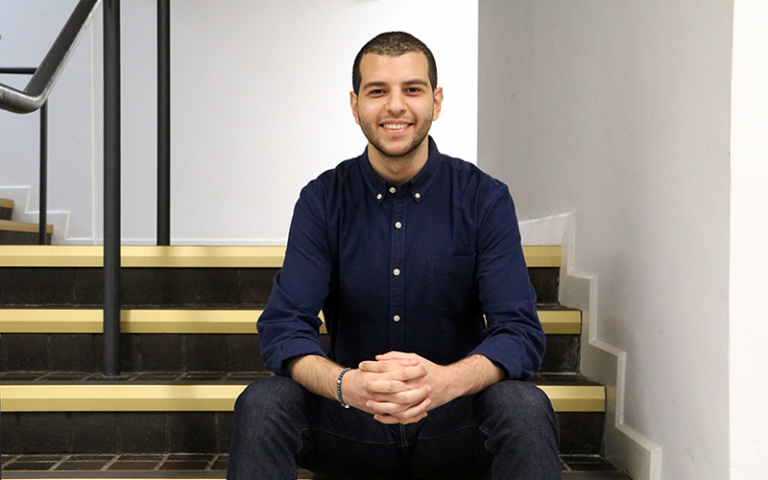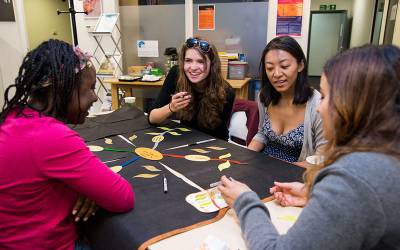Omar is a Social Sciences BSc graduate, class of 2020, from Lebanon. He tells us about taking control of his educational journey.

Tell us about your journey into UCL and university study.
I applied to UCL because of the approach to education here - the Social Sciences BSc is very interdisciplinary but you can also specialise in a subject that you are interested in so it gives students a lot of flexibility to shape their education and their degree the way they want it to be. That was very appealing to me because I did not want to be restricted to one specific subject. I studied Psychology, Public Health and Sociology. Many of my modules were interdisciplinary. For instance, I took a module called Public Health in Context which I received the highest grade on so far, and reiterated my passion to build a career in public health.
What were your first impressions?
It was daunting but in a good way. UCL is obviously such a big place but being here for the first time was very inspiring. UCL is such a strong institution when it comes to research. Often I will be reading an article on BBC News and it is discussing research which is being done at UCL so I felt like I was at the cutting-edge of research and that is really exciting.
What have you found most valuable about your degree programme?
The transferrable skills and the things that we were taught that are really relevant to the job market. For example in my first year I did two modules which were about research methods (an Introduction to Social Science Research and a Discovering Qualitative and Quantitative Research Methods module) and I also completed a literature review and a mixed methods research project. Having done these projects and modules I felt more equipped to find internships. I completed a Research Internship at Ipsos Mori, and also found a Research Assistant position so the applicability of modules to job positions has been very valuable.
How do you think the system of learning at UCL differs from that in your home country?
I really value education here because ultimately it is up to the student whether they want to get involved in their education or not. There is a lot of freedom! You are not spoon-fed material, it is up to you to do the reading and it is up to you to get involved. The student here is the person shaping their education. Yes there are lecturers, and yes there are module leaders that obviously are there to support us and to provide the education for us but the decision of being invested in your education is ultimately yours.
That differs from back home in Lebanon. In Lebanon there is a lot of pressure put on teachers, there is more of a focus on contact hours and students are not given as much freedom or responsibility.
“Here, I feel like I am the one that is taking control of my education - that is very different to how education is back home."
What would you say to somebody thinking of applying to study your course?
If you want to study an inter-disciplinary global degree that is going to change your perspective on social issues or help you shape ideas and views on social issues and the world around you then this degree will do just that.
What is the biggest challenge you faced while studying?
Time management. You need to build that skill of managing your time and using it effectively. One of the biggest challenges I faced was having a lot of independent study time but not knowing what to do exactly with that time, I had to learn how to use my time efficiently. Now I understand how to better plan ahead for my modules, and prioritise certain commitments over others.
As the year went on and the modules got more in depth my time management improved but also module leaders are always there for us. I asked for help from my tutors, for instance I have asked for help with essay plans, and after a lecture you can go up to a tutor and ask how to better prepare for the module or ask about specific readings.
What can you tell us about UCL’s facilities?
I personally like to associate studying with a specific place so I always go to the same place to study. My favourite library is IOE’s library which is great, the people there are very helpful at finding books and finding guides such as essay writing guides. The website is really helpful with telling you how many spaces are available so before going into the library you can check the website.
On a personal level I have felt very supported by my department. Whenever I struggled with something I could always go and talk to my personal tutor about it and it doesn’t have to be related to academics, it could be personal struggles as well. My personal tutor was even there for me when I was trying to write a specific letter to my landlord! University is not just about academics, it is very important to take care of your overall wellbeing.
What do you do when you’re not studying?
I co-founded the Social Sciences Society and that was very exciting. Social Sciences is very broad, so people from lots of different degrees could join our society. It is really great to have people from so many degree programmes be a part of it.
While serving as the First Year Representative for my course, I realised that I still somehow wanted to be involved in facilitating student-staff relations and improving the overall experience for everyone; so I became part of UCL Change Makers. We were a team of students studying Social Sciences and together we conducted surveys, held focus groups and conducted interviews to really understand the student experience and identify any improvements the Department could make.
I was also part of the UCL’s Model United Nations Society which was very fun. Debates were held every Tuesday on different topics and we got to travel to different universities to debate other university students from all around the world. We went to the Cambridge Model United Nations Conference.
I thought of joining the film society because I feel that social justice issues can be portrayed in a very powerful way through film and a large part of my degree is about social justice and social issues. Some professors in my department actually do documentary film making to showcase their work so it is something that I am very interested in.
Tell us what it is like to live and study in London.
Studying in London was very exciting. It exceeded my expectations. I met new people from all around the world, encountered new perspectives and had my ideas challenged every day. I could have an idea on something and then someone would challenge it in a seminar and they would convince me otherwise so it is really exciting getting to have debates on different topics. In terms of meeting people, I have honestly never had such an experience in my life where I have met so many people from different countries and made so many new friends.
At UCL and in London you have access to lots of different events and exhibitions. I have been to photo galleries and the exhibitions have been discussing stuff that is related to my course. It is really exciting to learn something and then go to a museum or an art gallery and realise that what you are learning is very relevant and it is being discussed across society in different ways. For example, I went to the Photographers’ Gallery with a friend, to see a new exhibition showcasing the work of Tish Murtha (Tish Murtha: Works 1976 – 1991) and it was eye-opening to see how brilliantly she portrays some of the issues we dissect in Social Sciences, such as economic inequality, racial tensions and social stigma and phenomenons such as social change.
Have you lived in UCL accommodation?
Yes, I lived in College Hall in my first year. It was very helpful because there are already so many things going on in first year as you are trying to settle in. Settling in at halls makes settling in at university less intense as there are staff that are always there to support you and you get to meet students who are all finding their way too.
What do you hope to do after completing your degree?
I have a couple of things in mind. One of them is pursuing a Master's in the field of Public Health, and also Data Science.
In my first year I went to many of the UCL Careers talks. They have helped me in lots of ways, such as developing my interview and presentation skills and finding jobs on the careers website (where I found my internship and my part-time job as a Research Assistant).
My advice to a first year student now would be: make use of all the resources that are available. My CV has improved drastically after going to events hosted by the UCL Careers Services and it was really helpful in understanding the little things that can make a big difference.
 Close
Close


